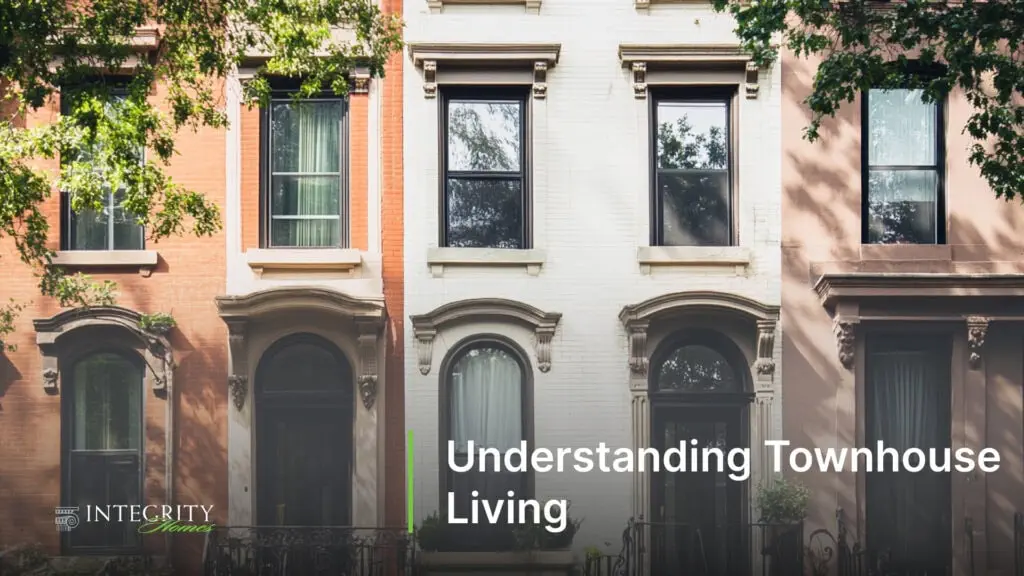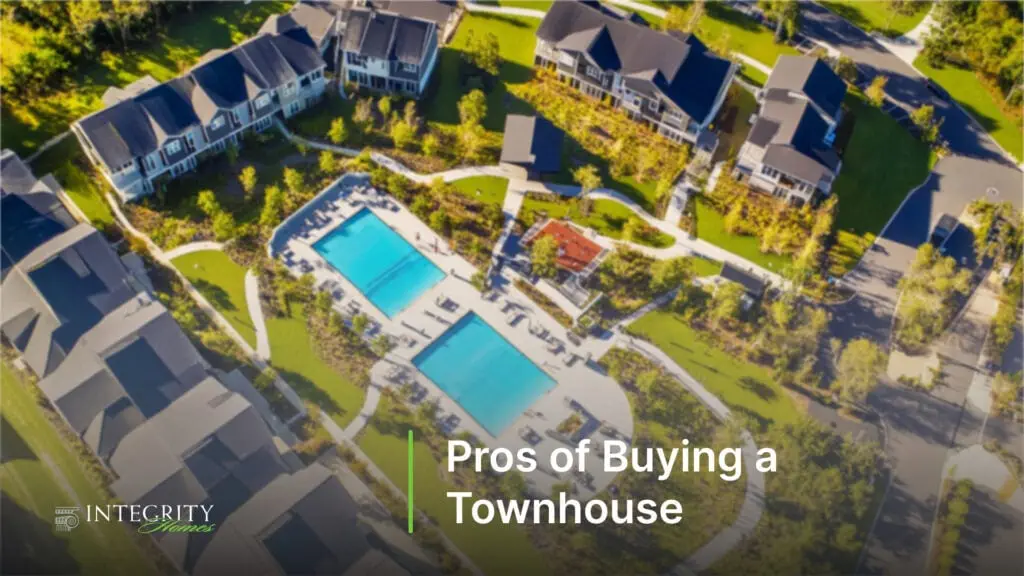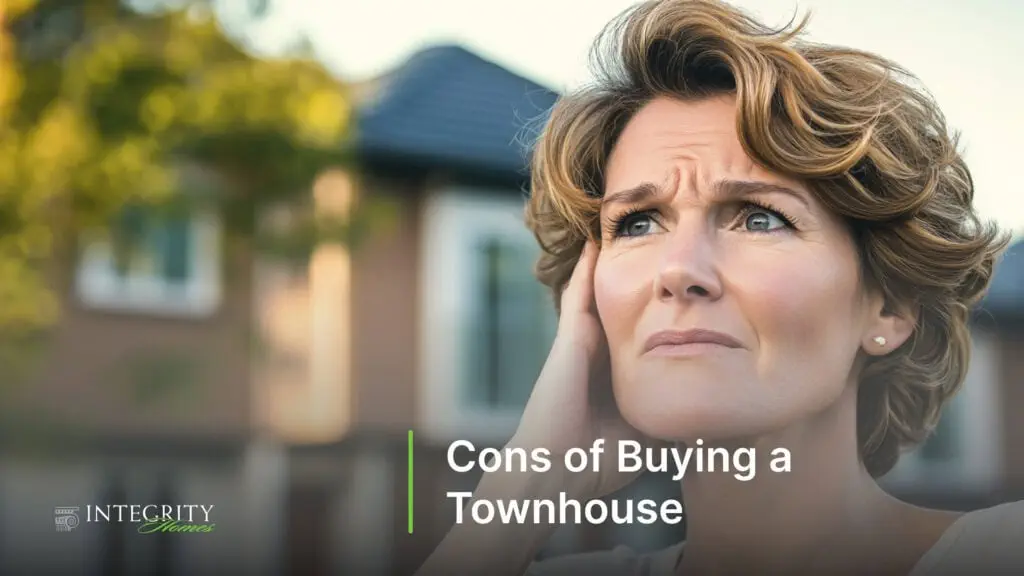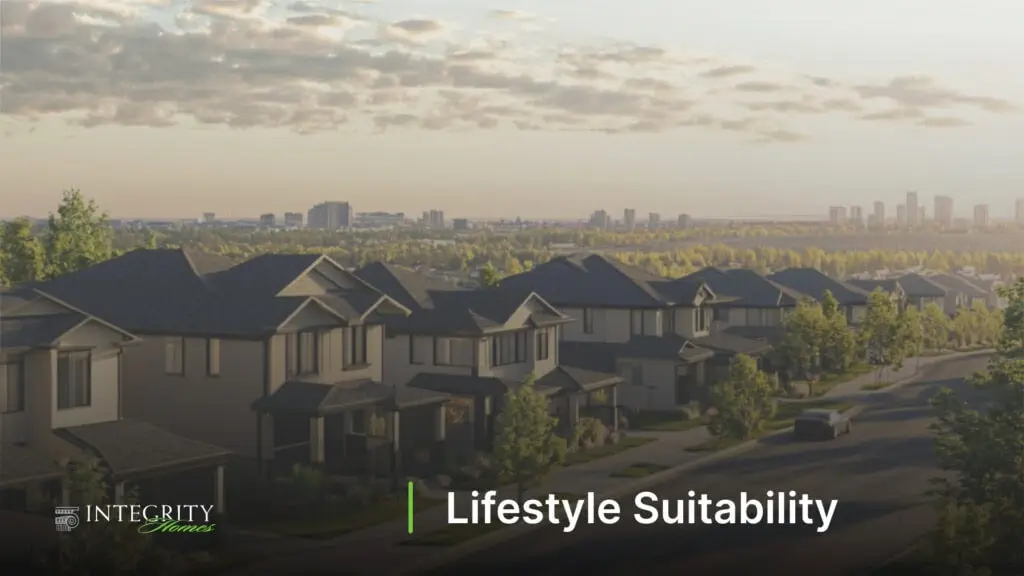
Is buying a townhouse a bad idea? We’ll tackle this question by examining all the benefits and drawbacks, financial considerations, and lifestyle factors. By the end, you’ll know if a townhouse is the right choice for you.

Living in a townhouse presents an attractive combination of the seclusion associated with single-family homes and the communal aspects typical of apartment residences. There’s been a notable surge in their popularity, evidenced by a 35% increase in townhouse construction from 2020 to 2021. This upswing reflects home buyers’ burgeoning appreciation for the equilibrium that townhouse living provides.
Numerous townhouse communities come equipped with common outdoor spaces such as parks and walking trails that cultivate a strong sense of camaraderie among residents. Many townhouse communities also benefit from being closer to shared amenities and conveniences due to their compact design. Our discussion will delve into what characterizes a townhome, contrast it with condominiums, and evaluate how they stand when compared to individual family houses.
A townhouse is a multi-floor home. It shares at least one wall with neighboring properties. These homes often include small yards or patios, offering a taste of private outdoor space. Townhouses typically feature two to three stories, creating a spacious living environment compared to single-level condos.
Whether sharing walls or standing as a detached home, townhouses provide flexibility in design and living arrangements.
One significant distinction between condos and townhouses lies in the realm of ownership. Owners of condominiums possess their private units but collectively hold the common areas, whereas owners of a townhouse usually own not only the building itself but also the land on which it stands. Condo owners share ownership of common areas, which can impact appreciation and resale value differently compared to townhouse ownership.
Offering more living space and creating an atmosphere akin to home ownership due to their multiple levels and interconnected walls, townhouses stand in contrast to condos that are frequently single-level units within expansive structures. Both housing styles necessitate contributing maintenance fees dedicated to upkeep and facilities shared by all residents.
Is a townhouse a single family home? Comparing townhouses to single-family homes, the primary differences lie in space, privacy, and maintenance. Townhouses are typically multi-level with shared walls, offering less privacy than single-family homes. However, this design provides more living space within the same footprint compared to single-level homes.
Townhouses also often feature unique designs within the same community, offering individuality not always found in rowhouses.

Many home buyers find the option of purchasing a townhouse enticing due to its numerous benefits. These homes offer a happy medium, blending the seclusion found in single-family homes with the community feel that comes from apartment living, which is especially appealing for families looking for security and neighborly just as much freedom and connections.
Investors too have taken notice of townhouses as they tend to be more budget-friendly compared to single-family homes. This affordability has elevated townhouses to become the second-most favored type of home among buyers across the United States as evidenced by their popularity rankings in 2022.
Affordability stands out as a key advantage for those contemplating the purchase of a townhouse over single-family homes. The more attainable pricing of townhouses can be attributed to factors such as smaller plots, the presence of shared walls, and reduced maintenance expenses. Townhouses present an attractive option for first-time homebuyers seeking to navigate the path toward home ownership with financial ease and practicality.
Living in a townhouse typically offers residents the benefit of a low maintenance way of life. Townhouses require significantly less exterior maintenance compared to single-family homes, making them appealing to first-time homebuyers who wish to avoid the costs and time associated with maintaining larger properties. In contrast to single-family homes, these dwellings require considerably less upkeep on the exterior, which is commonly handled by the homeowners’ association (HOA). Responsibilities such as landscaping and snow removal are usually included within the HOA fees, alleviating much of the maintenance load from property owners.
This arrangement provides those living in townhouses with an opportunity to relish their space without being weighed down by heavy-duty maintenance tasks.
In numerous townhouse communities, residents benefit from an assortment of communal amenities that significantly improve their living experience. Facilities such as pools, fitness centers, clubhouses, community gardens, and outdoor walking paths are commonly available within these neighborhoods. These features not only facilitate recreational pursuits, but also contribute to cultivating a robust sense of community and camaraderie among inhabitants.
The lifestyle in townhouse communities is enhanced by various events and activities designed to promote social engagement and strengthen neighborhood ties.

When considering the purchase of a townhouse, it’s important to be aware of certain downsides. These consist of reduced privacy, the obligation for HOA (Homeowners Association) fees and adherence to its rules, as well as constraints regarding available space. Due to these factors, many families opt for single-family homes that offer more room and greater seclusion in contrast to townhouses.
Prospective buyers may encounter strong competition in the housing market owing to a heightened interest in townhouses. This can present difficulties for those looking to secure such properties.
Living in a townhouse often comes with the downside of having less privacy because you share walls with your neighbors and live very near to them. This situation can result in noise disruptions and a decreased sense of personal space, especially when compared to living in traditional detached homes.
The architecture of townhouses could present considerable difficulties for individuals who prioritize their privacy due to this close quarter arrangement.
Monthly HOA fees can notably elevate the total expense associated with townhouse ownership. It is crucial to understand the homeowner’s association fees and what they cover before purchasing a townhouse. These fees are typically utilized for upkeep of shared spaces, garden and lawn care, and facilities provided within the community. They tend to accumulate rapidly. Homeowners associations commonly enforce regulations that restrict alterations to property exteriors and dictate specific aesthetic guidelines, which may be perceived as restricting by certain proprietors.
Compared to single-family homes, townhouses often come with reduced living space and less square footage, potentially making them a tight fit for larger families. In contrast, a single family house offers more space and privacy, which can be beneficial for larger families. Their limited outdoor space can also pose challenges in meeting the demands of an expanding family’s lifestyle. Consequently, these types of dwellings are typically more fitting for smaller families or individuals without children.

It’s essential to thoroughly assess different economic aspects when purchasing a townhouse, as they can offer a cost-effective solution in locations where real estate prices are steep.
Important financial elements to contemplate include the initial down payment required, the expenses associated with closing the transaction, ongoing property taxes, and utility costs, along with considering the possibility that the property’s value may increase over time.
A down payment, which typically represents a portion of the home’s sale price, is a crucial element in acquiring a property. This sum is subtracted from the total townhouse cost of the house to calculate the remaining amount that will be financed.
Distinct from the down payment are closing costs. These fees must be paid at settlement and can significantly increase initial expenses when completing a real estate transaction.
The amount of property taxes owed on a townhouse can vary depending on the area, the dimensions of the property, and tax rates determined by local authorities. Owners of townhouses might also find themselves paying less in continuous expenses than owners of detached homes because they often face lower property taxes and utility costs.
Some utilities like water services and garbage pickup could be covered under HOA fees for a townhouse, which offers an extra financial advantage to residents.
In markets where demand is strong, especially those with a shortage of new builds, townhouses tend to experience good appreciation. The presence of shared walls and various regulations can restrict their appreciation when compared to detached homes.
It’s essential to take into account the long-term investment prospects since Townhouses have a more gradual rate of appreciation than single-family homes.

The townhouse lifestyle accommodates diverse preferences, providing homeowners associations an environment that demands minimal upkeep and attracts a broad range of purchasers. These homes are typically located in both urban and suburban landscapes, designed with several levels and walls adjoining neighboring units.
We will delve into the appropriateness of living in a townhouse within urban compared to suburban regions, factors involving families, and considerations for future objectives.
Numerous townhouses can be found in areas that bridge the gap between urban and rural settings, affording residents a blend of city and country living. Townhouses situated in urban environments boast convenient proximity to metropolitan conveniences and transit systems, catering perfectly to individuals who prefer a vibrant lifestyle.
In contrast, those positioned in suburban locales typically come with more expansive interiors and private outdoor areas, appealing greatly to families seeking peace as well as additional space.
Single-family homes provide more exterior space compared to townhouses, potentially restricting the range of outdoor leisure pursuits for families. The structure of townhouses, being multi-leveled, might pose difficulties for certain residents.
Nevertheless, in suburban areas, townhouses are often designed with ample interior spaces and private yards that cater well to families seeking additional living space and a peaceful setting.
Potential buyers contemplating future lifestyle adjustments should assess their space requirements. Townhouses could be a smart choice due to reduced maintenance and utility costs, yet it is crucial to weigh how the property aligns with forthcoming financial strategies and lifestyle demands when considering them as a good investment.

For those considering buying a townhouse, several practical tips can help make the process smoother and more successful. Common buyers of townhouses include first-time homebuyers, second home seekers, and those looking to downsize.
This section will cover the importance of hiring an experienced real estate agent, understanding HOA fees, and getting a home inspection.
When purchasing a townhouse, having an experienced real estate agent can provide valuable guidance in market insights, negotiations, and paperwork.
Typically, the seller pays the real estate commission, which can be advantageous for buyers.
Prospective buyers of townhouses must grasp the significance of HOA fees and their coverage. These obligatory charges contribute substantially to total housing costs, including upkeep of shared spaces, care for landscaping, and various shared amenities that can reduce maintenance responsibilities for each homeowner.
It’s crucial for buyers to meticulously review the rules and regulations set forth by the HOA since they could impose limitations on alterations to properties as well as influence lifestyle decisions.
Before finalizing the purchase of a townhouse, it is crucial to conduct a comprehensive home inspection that examines both the interior and exterior for any concealed issues. Such an inspection is vital in uncovering potential problems that could lead to costly repairs, thereby offering buyers reassurance and potentially saving them from future expenses.
In summary, the decision to purchase a townhouse brings together cost-effectiveness, ease of upkeep, and communal living advantages. Although benefits such as shared amenities and low maintenance are appealing aspects of townhouse life, one must also weigh drawbacks like reduced privacy and HOA fees. From a financial perspective, townhouses present more affordable housing options with the potential for lower utility costs. They may not appreciate in value as much as single-family homes.
Deciding whether or not to buy a townhouse should be based on personal lifestyle preferences, your financial status, and future aspirations. With an appreciation of essential considerations highlighted in this blog post along with valuable guidance provided hereunder, you will enable you to choose wisely according to what aligns best with your needs. Discover what opportunities lie within choosing a townhouse and opt for the path that maximizes both your contentment and gains.
Buying a townhouse is great because it’s usually more affordable, requires less maintenance, and often comes with access to community amenities.
This means you can enjoy a simpler, more convenient lifestyle without breaking the bank.
Townhouse living can feel restricted because of shared walls, which reduces privacy. Plus, those HOA fees can add up, and their rules might limit your ability to customize your space.
HOA fees are a key part of townhouse ownership, affecting your monthly expenses while also covering common area maintenance and shared amenities.
Just keep in mind they can come with rules that might restrict how you can use or modify your property.
Absolutely, townhouses can be a solid investment, particularly in areas with high demand and restricted new builds.
Just keep in mind that while they generally appreciate, their value growth might not be as rapid as single-family homes.
When buying a townhouse, it’s essential to understand HOA fees and what they cover, hire a reliable real estate agent, and get a thorough home inspection.
These considerations will help protect your investment and make your home purchase smoother.
Maryland | Frederick, MD | National Harbor, MD | Potomac, MD
Virginia | Alexandria, VA | Fairfax, VA | Lorton, VA | Northern, VA | Stafford, VA | Stephenson, VA | Winchester, VA | Washington DC